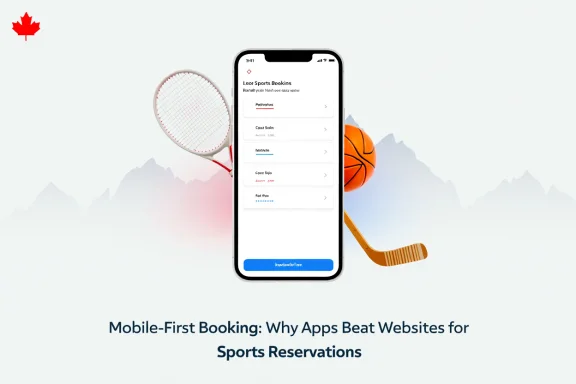Mobile-First Booking: Why Apps Beat Websites for Sports Reservations

Picture this: you’re leaving work in downtown Toronto on a Tuesday evening, and you suddenly remember you want to book that squash court for tomorrow morning. Do you fire up your laptop when you get home, or do you pull out your phone right there on the TTC? If you’re like 78% of Canadians, you’re reaching for that phone faster than a Zamboni clears ice between periods.
The shift toward mobile-first booking isn’t just a trend – it’s a complete transformation of how Canadians interact with sports facilities from Charlottetown to Victoria. For facility managers across the country, understanding this shift could mean the difference between packed courts and empty venues.
The Canadian Mobile Sports Scene: By the Numbers
Statistics Canada reports that 94% of Canadians aged 15 and older use smartphones regularly, with sports and fitness apps among the top downloaded categories. But here’s the kicker: when it comes to booking sports facilities, mobile apps consistently outperform traditional websites in three crucial areas.
Speed is everything when you’re dealing with active individuals. The average mobile app booking takes 47 seconds from opening to confirmation. Compare that to website bookings, which average 2.3 minutes on desktop and a frustrating 3.1 minutes on mobile browsers. When prime court times disappear faster than snow in a chinook, those extra minutes matter.
User retention tells the real story. Canadian sports facilities using dedicated mobile apps report 67% higher booking frequency compared to website-only operations. Members who download facility apps book an average of 4.2 times per month, while website users average just 1.8 bookings monthly.
Why Apps Win: The Psychology Behind Mobile Booking
Instant Gratification Meets Canadian Lifestyle
Canadians lead busy lives, juggling work, family, and the eternal quest for decent hockey tickets. Mobile apps tap into what researchers call “micro-moments” – those brief windows when we make quick decisions.
Dr. Sarah Mitchell from the University of British Columbia’s Digital Behavior Lab explains: “When someone decides they want to play tennis after work, they want to book immediately. Apps eliminate the friction of typing URLs, remembering passwords, and navigating complex menus.”
The Commuter Advantage
Consider the daily reality for millions of Canadians. Whether you’re on the SkyTrain in Vancouver, stuck in traffic on the 401, or waiting for the C-Train in Calgary, your phone is your primary connection to the world. Apps work seamlessly offline and sync when connectivity returns – crucial for our vast country where cell service can be spotty between cities.
Technical Advantages That Matter in the Real World
Push Notifications: Your Court Is Ready
Apps can send targeted notifications about:
- Last-minute cancellations at your preferred facilities
- Weather updates affecting outdoor bookings (especially important during our unpredictable springs)
- Reminder alerts 24 hours before your booked time
- Special promotions during off-peak hours
GPS Integration for Multi-Location Facilities
Many Canadian cities have recreation networks spanning multiple locations. Apps can automatically suggest the nearest facility, provide driving directions, and even integrate with local transit apps like TransLink or the TTC.
Biometric Authentication
Face ID and fingerprint login eliminate password frustration – particularly valuable when you’re trying to snag that 6 AM ice time before the rink fills up.
The Revenue Impact for Canadian Facilities
Facilities across Canada report significant financial benefits from mobile-first strategies:
Increased Booking Volume: Recreation centers in Edmonton saw 34% more bookings within six months of launching their app, with the biggest gains during traditional off-peak hours.
Reduced No-Shows: Automatic reminders and easy rescheduling features cut no-show rates from 18% to 7% at facilities surveyed across Ontario.
Higher Member Engagement: Apps enable features like workout tracking, social challenges, and community boards that keep members connected year-round.
Overcoming Common Canadian Challenges
Seasonal Considerations
Canadian sports facilities face unique seasonal challenges. Apps can dynamically adjust available activities – promoting indoor courts during our legendary winters and highlighting outdoor options during those precious summer months.
Rural and Remote Access
For facilities serving smaller communities, apps can operate effectively on slower connections and store essential information offline. This is crucial for hockey arenas in northern communities or tennis clubs in rural areas where high-speed internet isn’t guaranteed.
Bilingual Requirements
Apps can seamlessly switch between English and French interfaces, meeting federal accessibility requirements while providing personalized experiences for users across the country.
Implementation Tips for Facility Managers
Start With User Research
Survey your current members about their mobile habits. A community center in Halifax discovered that 89% of their members preferred booking via phone but had never been offered an app option.
Focus on Core Features First
Begin with essential functions:
- Real-time availability checking
- One-tap booking and payment
- Easy cancellation and rescheduling
- Basic account management
Integrate With Existing Systems
Your app should work seamlessly with current booking software, payment processors, and membership databases. Many Canadian facilities use cloud-based systems that integrate well with mobile platforms.
Looking Ahead: The Future of Mobile Sports Booking
Emerging trends include AI-powered scheduling suggestions, integration with fitness trackers, and social features that help members connect with playing partners. Facilities that embrace mobile-first thinking now position themselves for continued success.
The evidence is clear: mobile apps aren’t just convenient extras – they’re essential tools for modern sports facility management. Whether you’re running a curling club in Saskatoon or a tennis facility in St. John’s, the question isn’t whether to go mobile, but how quickly you can make the transition.
Ready to transform your facility’s booking experience? Start by analyzing your current mobile traffic and surveying member preferences. The courts are waiting, and your members are ready to book – right from their phones.